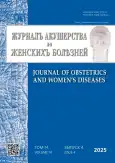Экспрессия лейкоцитарного антигена человека, изотипа DR (II класса) при различных формах эндометриоидной болезни
- Авторы: Печеникова В.А.1, Петровская Н.Н.1, Сафронов А.О.1
-
Учреждения:
- Северо-Западный государственный медицинский университет им. И.И. Мечникова
- Выпуск: Том 74, № 4 (2025)
- Страницы: 67-75
- Раздел: Оригинальные исследования
- Статья получена: 24.05.2025
- Статья одобрена: 15.07.2025
- Статья опубликована: 26.08.2025
- URL: https://journals.eco-vector.com/jowd/article/view/680306
- DOI: https://doi.org/10.17816/JOWD680306
- EDN: https://elibrary.ru/HFCBVV
- ID: 680306
Цитировать
Полный текст
Аннотация
Обоснование. Определяющее значение в развитии эндометриоза имеют нарушения в работе иммунной системы, контролирующей процессы адгезии, инвазии, пролиферации, апоптоза и неоангиогенеза. Важная роль при этом заболевании отведена иммуногенетическим аспектам прогрессирования эндометриоза, в частности влиянию главного комплекса гистосовместимости (major histocompatibility complex), или человеческого лейкоцитарного антигена (human leukocyte antigens, HLA), на регуляцию функционирования иммунной системы. Однако особенности его экспрессии при различных формах эндометриоидной болезни малоизучены.
Цель исследования — установить особенности экспрессии лейкоцитарного антигена человека изотипа DR (HLA-DR) II класса в эндометриоидных гетеротопиях при различных формах эндометриоидной болезни: аденомиозе, эндометриоидных кистах яичников, экстрагенитальном эндометриозе.
Методы. Проведено ретроспективное исследование. Выполнены морфологическое и иммуногистохимическое исследования операционного материала. Второе проводили по стандартной авидин-биотиновой методике с использованием моноклональных мышиных антител к HLA-DR II класса.
Результаты. Включены 329 женщин в возрасте от 18 до 47 лет, получивших оперативные вмешательства по поводу эндометриоза различной органной локализации: 98 случаев внутреннего генитального эндометриоза (аденомиоза), 196 наблюдений эндометриоидных кист яичников, 35 наблюдений экстрагенитального эндометриоза (21 случай эндометриоза послеоперационного рубца и 14 — эндометриоза различных отделов кишечника). Независимо от органной локализации эндометриоидной болезни обнаружена четкая закономерность в экспрессии HLA-DR II класса. HLA-DR-положительные клетки цитогенной стромы найдены в очагах аденомиоза, капсуле эндометриоидных кист и гетеротопиях экстрагенитальной локализации. В статистически значимо большем количестве их выявляли при эндометриозе послеоперационного рубца — 79 [75; 104], эндометриозе кишечника — 55 [50; 59], аденомиозе — 56 [32; 97], а при эндометриоидных кистах значение их экспрессии составило 14 [10; 63]. Эпителий желез эндометриоидных гетеротопий с признаками пролиферации или секреции был HLA-DR-отрицательным при всех изученных формах эндометриоидной болезни — аденомиозе, эндометриозе послеоперационных рубцов, эндометриозе кишечника. Положительная экспрессия HLA-DR II класса обнаружена только в эпителиальной выстилке кистозно-трансформированных желез очагов аденомиоза и экстрагенитального эндометриоза. Наибольшее количество HLA-DR-положительных эпителиальных клеток выявлено в выстилке эндометриоидных кист яичников. Ее интенсивность в 12,3% наблюдений была слабой, в 72,3% — промежуточной, в 15,4% — сильной.
Заключение. Полученные данные позволяют выдвинуть гипотезу о том, что HLA-DR-положительный фенотип эндометриоза, вероятно, отражает особый морфогенез и нарушения в геноме клетки, ассоциированные с хроническим воспалением и имеющие значение для прогноза клинического течения заболевания. Это подлежит дальнейшим комплексным клинико-морфологическим и молекулярно-генетическим исследованиям.
Полный текст
Об авторах
Виктория Анатольевна Печеникова
Северо-Западный государственный медицинский университет им. И.И. Мечникова
Автор, ответственный за переписку.
Email: p-vikka@mail.ru
ORCID iD: 0000-0001-5322-708X
SPIN-код: 9603-5645
д-р мед. наук, профессор
Россия, Санкт-ПетербургНиколь Николаевна Петровская
Северо-Западный государственный медицинский университет им. И.И. Мечникова
Email: dr.ramzaeva@mail.ru
ORCID iD: 0000-0001-6849-5335
SPIN-код: 7769-1969
канд. мед. наук
Россия, Санкт-ПетербургАртем Олегович Сафронов
Северо-Западный государственный медицинский университет им. И.И. Мечникова
Email: Safr-Ar@yandex.ru
ORCID iD: 0000-0001-6625-2479
SPIN-код: 6180-8844
Россия, Санкт-Петербург
Список литературы
- Adamyan LV, Arslanyan KN, Loginova ON, et al. Immunological aspects of endometriosis: review of the literature. Lechaschi vrach. 2020;(4):37–47. (In Russ.) doi: 10.26295/OS.2020.29.10.007
- Symons LK, Miller JE, Kay VR, et al. The immunopathophysiology of endometriosis. Trends Mol Med. 2018;24(9):748–762. EDN: YHTFMD doi: 10.1016/j.molmed.2018.07.004
- Chiang CM, Hill JA. Localization of T cells, interferon-gamma and HLA-DR in eutopic and ectopic human endometrium. Gynecol Obstet Invest. 1997;43(4):245–250. doi: 10.1159/000291866
- Ota H, Igarashi S. Expression of major histocompatibility complex class II antigen in endometriotic tissue in patients with endometriosis and adenomyosis. Fertil Steril. 1993;60(5):834–838. doi: 10.1016/s0015-0282(16)56284-0
- Baka S, Frangou-Plemenou M, Panagiotopoulou E, et al. The expression of human leukocyte antigens class I and II in women with endometriosis or adenomyosis. Gynecol Endocrinol. 2011;27(6):419–424. doi: 10.3109/09513590.2010.495429
- Guarene M, Capittini C, De Silvestri A, et al. Targeting the immunogenetic diseases with the appropriate HLA molecular typing: critical appraisal on 2666 patients typed in one single centre. Biomed Res Int. 2013;2013:904247. doi: 10.1155/2013/904247
- Nordquist H, Jamil RT. Biochemistry, HLA Antigens. In: StatPearls [Internet]. Treasure Island (FL): StatPearls Publishing, 2024. [cited 2024 Dec 26]. Available from: https://pubmed.ncbi.nlm.nih.gov/31536268/
- Troshina EA, Yukina MYu, Nuralieva NF, et al. The role of HLA genes: from autoimmune diseases to COVID-19. Problems of Endocrinology. 2020;66(4):9–15. EDN: FXVGYQ doi: 10.14341/probl12470
- Ho HN, Chao KH, Chen HF, et al. Peritoneal natural killer cytotoxicity and CD25+ CD3+ lymphocyte subpopulation are decreased in women with stage III-IV endometriosis. Hum Reprod. 1995;10(10):2671–2675. EDN: IPDEVX doi: 10.1093/oxfordjournals.humrep.a135765
- Králíčková M, Vetvicka V. Immunological aspects of endometriosis: a review. Ann Transl Med. 2015;3(11):153. EDN: YYGRBR doi: 10.3978/j.issn.2305-5839.2015.06.08
- Yan J, Zhou L, Liu M, et al. Single-cell analysis reveals insights into epithelial abnormalities in ovarian endometriosis. Cell Rep. 2024;43(3):113716. EDN: YOHNAR doi: 10.1016/j.celrep.2024.113716
- Liu Y, Luo L, Zhao H. Immunohistochemical study of HLA-DR antigen in endometrial tissue of patients with endometriosis. J Huazhong Univ Sci Technolog Med Sci. 2002;22(1):60–61. doi: 10.1007/BF02904791
- Maxwell C, Kilpatrick DC, Haining R, et al. No HLA-DR specificity is associated with endometriosis. Tissue Antigens. 1989;34(2):145–147. doi: 10.1111/j.1399-0039.1989.tb01729.x
- Koumantakis EE, Panayiotides JG, Goumenou AG, et al. Different HLA-DR expression in endometriotic and adenomyotic lesions: correlation with transvaginal ultrasonography findings. Arch Gynecol Obstet. 2010;281(5):851–856. doi: 10.1007/s00404-009-1168-z
- Ellinidi VN, Smaglenko EA, Pechenikova VA, et al. Human leukocyte antigen, isotype DR (HLA-DR) expression in the normal endometrium and in endometrial pathology. Journal of Obstetrics and Women’s Diseases. 2024;73(5):96–104. EDN: FSOUXH doi: 10.17816/JOWD632930
Дополнительные файлы












